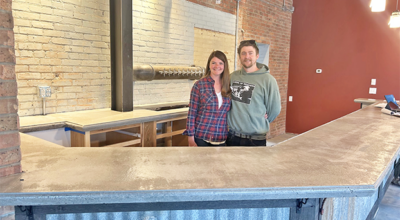Police combat rise of meth
Published 7:40 pm Sunday, December 11, 2011

Cost of cleaning up these hazardous waste sites has filtered down from the federal government to the local level.
Policing authorities agree that methamphetamine is the drug of choice in rural areas. And Southwest Michigan is decidedly rural, but there are differences from one county to another. Cass County has been more susceptible to the problem than its much larger neighbor Berrien County.
“Production is volatile and smells and is more easily detectable” in populated areas, according to Cass County Prosecutor Victor Fitz. “Indiana’s had a real problem with it, and it’s seeped up into Michigan border counties. I think our intense focus on it has resulted in our numbers being lower than some of the other rural counties surrounding us.”
Meth crimes are seldom subject to plea-bargaining. Fitz’s office has won all 18 cases which have gone to jury trial since 2003.
Michigan State Police statistics show sevenlabs and 35 incidents in 2010 and four
labs and eight incidents in 2011, but only counts those active at the time of a raid, where Cass would count if components for cooking it are present, even if not percolating when arrests go down.
“I would say in Cass County (meth) has plateaued,” Fitz said. “The numbers have been fairly consistent for the last several years. Because we have had such a focus on it, the numbers haven’t continued to grow like we’ve seen in other counties. But it’s like fighting a battle. If the enemy’s not going away, you don’t disband and let them take over. Another analogy is grass growing. If you stop cutting it, it’s going to get out of control. But I think we’ve controlled it a lot better than some places around the nation for a variety of reasons.
“The drug millage has been integral, the savior of this county as far as methamphetamine is concerned. We hear from probation officers that meth offenders say, ‘Don’t go to Cass County if you’re going to make meth because they send you to prison.’ A lot of other counties negotiate these charges. My philosophy is a loud and clear message that if you do meth in Cass County you’re going to be severely impacted. Our job is not to save the individual, but to protect the public. If we can do both, so much the better.
“When I arrived here (in 2004), it was already established,” Fitz said. “Anhydrous ammonia was a huge component then. Every farm had tanks, so Cass was a natural draw” to meth makers. One stolen tank was found buried underground.
“It’s very distinct from cocaine, heroin or LSD. It’s a very clannish drug,” Fitz said. “Five to 10 people collect supplies, make the drug, use it and go out and do it again. We see them attracted to scrapping metal and to home invasions to finance their needs for components.”
With federal money gone for cleaning up toxic waste sites where meth was made, “We’ve had to find alternate sources,” such as making $547 part of restitution Circuit Judge MIchael Dodge orders during Friday morning sentencing.
“It’s better in the big picture than when I first started” in Cassopolis from Muskegon County. ”When I first started they operated with impunity,” Fitz said.
Then Dowagiac Police Department and Cass County Sheriff’s Office developed a joint drug enforcement team.
“One concerning trend we have seen is it creeping into urban areas,” such as Dowagiac, with the one-pot method which replaced anhydrous.
Fitz adds that “2010 was a heavy meth year consistently across the board, but with the introduction of contentiously more stringent pseudoephedrine laws in Michigan, that critical component became harder to find, helping to reduce meth labs. Also, because of our drug team, drug prosecutor and tough plea policies, we are doing a good job controlling the meth problem in Cass County.”
Berrien County: An easier battle
While neighboring counties Cass, Van Buren, Allegan and St. Joseph struggle against the battle with methamphetamine, Berrien County has been fortunate that meth hasn’t seeped into the community too heavily.
Berrien has had only 18 cases this year. Last year, the county reported a combined 19 meth labs and incidents and 15 in 2009.
Meanwhile, VanBuren has reported 38 meth labs and 29 incidents in 2011 and 31 labs and 46 incidents last year.
St. Joseph County (Mich.) has seen 33 incidents and 10 labs in 2011 and 58 incidents and 42 labs in 2010.
“Obviously surrounding counties, like Cass, have had quite a few more,” said Sheriff Paul Bailey. “Cass County has a lot of rural area. Meth is pretty much in the counties with rural, country area, spread out.”
Bailey also said that meth is a drug of choice for Caucasians.
“You don’t see a whole lot of meth in the inner cities,” he said, adding that marijuana, crack cocaine and heroine are the drugs of choice in Berrien County, specifically Benton Harbor.
Bailey said the lack of discovered meth labs isn’t due to lack of effort from police officers. The county has had a drug team in place since 1984, backed by a public safety millage.
“That’s helped to keep that segment of crime out of our county,” he said. “It’s a lot more prevalent in surrounding counties.”
Education has also been critical in battling against meth, according to Bailey.
“School districts do a good job of educating kids about what can happen to them,” he said. “We’re trying different programs in all the schools to give kids the tools to say ‘no.’”
Methamphetamine offenders aren’t the only ones paying the price for the use of the drug.
Paying the price
When federal meth cleanup money tanked early this year, local governments were left holding the bag.
Bailey said of the 18 cases in Berrien County this year, only three of the cleanups have been funded by the U.S. Drug Enforcement Administration. The other cleanups had to be paid for by the county — a total of $7,800.
Congress approved restoring $12.5 million in meth lab cleanup money last month. Bailey is hoping it will trickle down to Berrien County next year.






